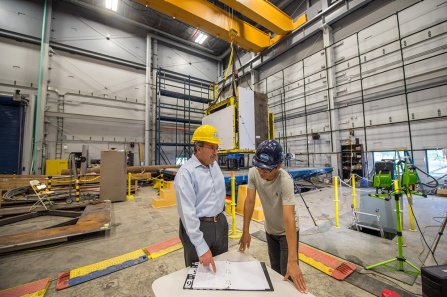BS in Civil Engineering

Civil engineers are responsible for some of the world's most critical infrastructure. UB's civil engineering program has produced professionals who are engaged in every area of the discipline. Our faculty, students and alumni have developed resilient buildings and structures, they have build and designed secure bridges and they have planned and enhanced various transportation systems. We also educate students in some of the emerging areas within the discipline like fire and wind engineering, among others.
Director of Undergraduate Studies, Civil Engineering
Dr. Qian Wang
231 Ketter Hall
qw6@buffalo.edu
Undergraduate Academic Coordinator
Ms. Amanda Allen
212D Ketter Hall
arallen2@buffalo.edu
The civil engineering curriculum includes math and science courses in the freshman and sophomore years, required civil engineering courses in the junior and senior years, and technical elective courses in the senior year. Civil engineering majors may pursue a general degree program or configure their electives to provide specialization in one of four sub-disciplines.
Senior year course selection
Careful selection of technical electives with design are important as students prepare for careers after graduation. Additionally, the technical elective with design will impact students' capstone design options in CIE 416.
The video below features program alumni who discuss their career choices, and senior year course selections. The various specialization tracks are also discussed.
Program Educational Objectives
Program educational objectives (PEOs) are broad statements that describe the expected accomplishments of graduates within a few years after graduation. The overall objective of the civil engineering program is that graduates will apply broad technical skills to develop solutions that protect the health, safety, and quality of life of the public. Specific PEOs are that graduates will:
- Serve ethically with recognition of the diverse needs of society and the profession
- Become leaders in their profession
- Understand and advance the mission of their employer
- Continue their professional development, including professional licensure, continuing education and/or graduate study
Student Outcomes
Student outcomes describe what students are expected to know and be able to do by the time of graduation. They relate to the knowledge, skills and behaviors students acquire as they progress through the program.
- Outcome 1: An ability to identify, formulate, and solve complex engineering problems by applying principles of engineering, science, and mathematics.
- Outcome 2: An ability to apply engineering design to produce solutions that meet specified needs with consideration of public health, safety, and welfare, as well as global, cultural, social, environmental, and economic factors.
- Outcome 3: An ability to communicate effectively with a range of audiences.
- Outcome 4: An ability to recognize ethical and professional responsibilities in engineering situations and make informed judgments, which must consider the impact of engineering solutions in global, economic, environmental, and societal contexts.
- Outcome 5: An ability to function effectively on a team whose members together provide leadership, create a collaborative and inclusive environment, establish goals, plan tasks, and meet objectives.
- Outcome 6: An ability to develop and conduct appropriate experimentation, analyze and interpret data, and use engineering judgment to draw conclusions.
- Outcome 7: An ability to acquire and apply new knowledge as needed, using appropriate learning strategies.

The Civil Engineering BS program is accredited by the Engineering Accreditation Commission of ABET under the commission’s General Criteria and Program Criteria for Civil and Similarly Named Engineering Programs.